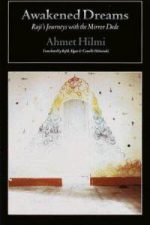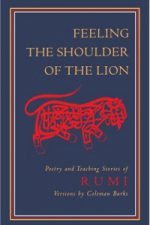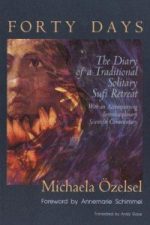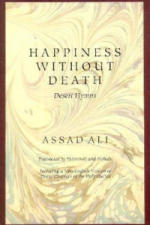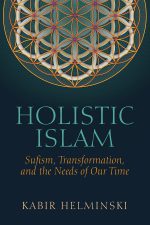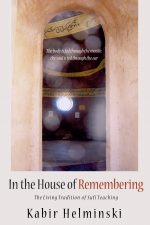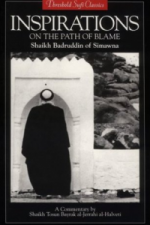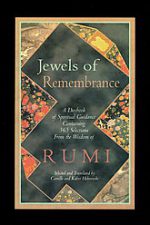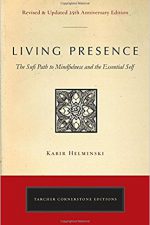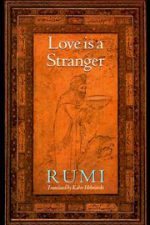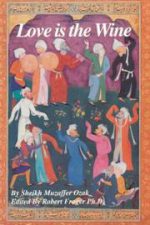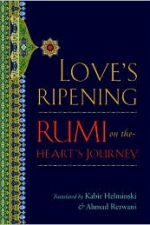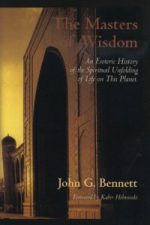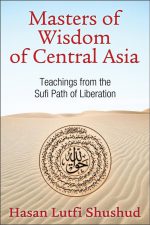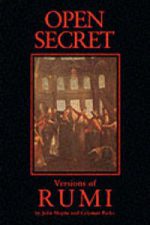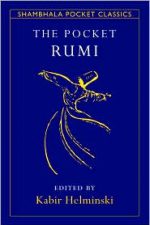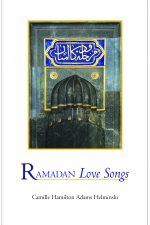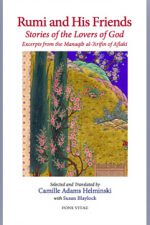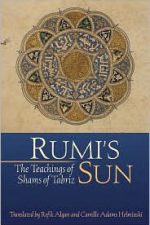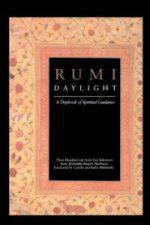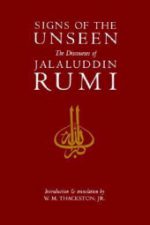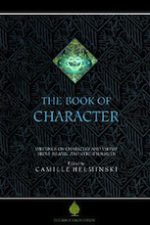-
Civilization of Paradise is both a collection of Qur’an inspired poetry and a fascinating record of intimate dialogs with a Sufi master in Damascus. Poetry, in the case of Asad Ali, is a way of life and prayer.
-
Poetry and Teaching Stories from the Mathnawi of Mevlana Jalaluddin Rumi
Versions by Coleman Barks These selections from the poetry of Rumi express the courage and intensity needed to overcome our ego-imprisonment. Much of Rumi's poetry circles around the mystery of Surrender. Some of it expresses a longing and even a bewilderment, but there is also much that expresses the discipline, clarity, and integrity that true Surrender requires. -
A Diary of a Traditional Sufi Retreat
By Michaela Ozelsel This first-hand account of a Sufi halvet (forty day retreat) is unique because it combines an autobiographical account of a spiritual education with contemporary research from several disciplines, thus being a bridge between ancient wisdom and scientific investigation. -
Desert Hymns
By Dr. Assad Ali The voice of these poems is the voice of the Desert in an ardent appeal to the heart of Reality. Each of these poems is also a lesson in higher education from a loving teacher, the Desert. As Dr. Ali himself says, "These hymns have not been written to address any one of the creatures, even though they are exuberant with creatures' concerns, and their true interest is in them and in appealing to God for them. They have been written in a method similar to physical training, but as spiritual training in the world of the body and the Word." -
Sufism, Transformation, and the Needs of Our Time
Islam once gave birth to a great civilization that respected religious diversity, freedom of conscience, and scientific thought, and Islamic knowledge contributed to the birth of humanism in the Renaissance. Today's world is desperately in need of a spirituality that is free of dogma, based in experiences not beliefs, one that can reconcile the human and spiritual realms. In his new book, renowned spiritual teacher and Sufi sheikh Kabir Helminski, gives us a compelling interpretation of spiritual or holistic Islam that will hearten contemporary Muslims looking for a faith suited for our times, and providing non-Muslims a brilliant introduction to this rich spiritual tradition. -
By Shaikh Badruddin of Simawna Commentary and translation by Tosun Bayrak al-Jerrahi In Inspirations (Waridat), Shaikh Badruddin interpreted many essential concepts of Islamic theology in an original and personal way which seems strikingly meaningful today. Melamiyya, or the "path of blame," is an approach to spiritual development within Islamic Sufism that avoids the appearance of piety and challenges the self-satisfaction of the ego.
-
A Daybook of Spiritual Guidance from the Wisdom of Mevlana Jalaluddin Rumi
Selected and translated by Kabir and Camille Helminski These "jewels" have been taken from Books III-VI of Rumi's masterpiece, the Mathnawi. A companion volume to the earlier Rumi: Daylight, this daybook may also be read in a turn-to-any-page approach. -
The Sufi Path to Mindfulness and the Essential Self
By Kabir Helminski Revised 25th anniversary edition Sufism is a centuries-old spiritual psychology leading to presence in life. Presence is our capacity to be whole in the moment, in alignment with our deepest wisdom. With unusual clarity, this book describes how presence is different from ordinary habits of mind, and how it can be developed. Drawing on the words of the great Sufi, Rumi, as well as traditional material and personal experience, this book integrates the wisdom of Sufism with the needs of contemporary life. Also available as an Amazon Audible audiobook, narrated by Iman Mortagy. -
By Jalaluddin Rumi Translated by Kabir Helminski Jalaluddin Rumi, one of the greatest mystics and poets the world has ever known, said, "love is a stranger and speaks a strange language." And yet Rumi's message of spiritual love speaks directly to our hearts after more than seven hundred years. This volume contains most of the earlier The Ruins of the Heart in revised form as well as an equal amount of new translations. A quintessential collection.
-
Tales of a Sufi Master in America
By Sheikh Muzaffer Ozak Generosity, faith, self-knowledge, submission, love... these themes unfold through the conversations of the Turkish Sufi master Sheikh Muzaffer, head of the Halveti-Jerrahi Order and one of the most important Sufi teachers of our time. A fine storyteller, a mature human being, a respected author in his native country, he was well-suited to bring the richness of the Sufi tradition to the West. The chapters of this book, skillfully edited and compiled by the noted psychologist Dr. Robert Frager, were derived from talks given during visits to America over the last years of his life. -
Rumi on the Heart's Journey
Translated by Ahmad Rezwani and Kabir Helminski Love is the meaning of our existence, the raw material of transformation, the glorious way of access to Divine intimacy. This teaching infuses the lyric verse of Rumi (1207–1273), the greatest of the Sufi poets. The poems in this collection, taken from among the master’s many volumes of work, focus on one of his greatest themes: how love grows and matures for those on the spiritual path. -
An Esoteric History of the Spiritual Unfolding of Life on This Planet
By J.G. Bennett J.G. Bennett was working on this book when he died. He details the unfolding of Spirit in matter to yield its ultimate fruit: a conscious human being totally free of egoism. He considers the possibility of an inner circle of humanity exerting its influence to establish cosmic Love in human life. In the course of telling this story, Bennett touches on the most ancient spiritual traditions of humankind: the Savior God, the Great Mother, the Creator God, and the Great Spirit traditions. He offers his own insights into the real mission of Christ, and for a good part of the book examines the teaching methods of the Central Asian Sufis, the Khwajagan. -
By Hasan Lutfi Shushud Almost one thousand years ago a nexus of spiritual transmission emerged in Central Asia and lasted for five centuries. This classic work lays out the entire lineage of teachers from the golden age of Islamic Sufism, examining their spiritual journeys, their writings and teachings, and their most famous sayings. Hasan Lutfi Shushud (1902-1988) was born near Izmir in Anatolia, Turkey. A renowned Sufi saint and master, he was perhaps best known for his role as final guide to Gurdjieff’s disciple J. G. Bennett.
-
Intimations of the Beauty and Power of the Divine by Camille Hamilton Adams Helminski We offer these reflections on the “Ninety-Nine Names of God,” traditional to Islam and the Quranic revelation, to support the increased opening of our awareness to all the Generosity and Loving-kindness of the Divine Bestowal. The Divine is so generous with the qualities of Being that in any moment they may be perceived in new ways, in varied intermingled resonances, with different hues, to touch our hearts and minds and souls and bodies, and awaken us in awe. Intimations of the Names, as they arrived within this heart, are included here in twos or threes or more, in clusters or constellations of Names, that we, dear reader, might be encouraged to look and witness again the dancing and singing of all the Names, even beyond the Ninety-Nine here expressed, in all the realms of our existence.
-
Versions of Rumi
By John Moyne and Coleman Barks "Felicitous new translations of Rumi, the witty and mystical, Villon-like poet... These reflections on love, the dance of selves, happiness, acceptance of life's sorrows, and the transitory nature of joy are touchingly sensitive in their search for philosophical peace of mind." -- Library Journal -
Edited by Kabir Helminski Here is a collection of the most inspiring poetry of Rumi, small enough to take anywhere. It contains selections from four previously published books, as well as new translations of short lyric poems.
-
Through this second collection in the “Songs of the Soul” series, we encounter a world where Divine Grace is always with us and every moment is an opportunity to “begin again” in God’s Name. Whether amidst expansion or contraction, whether witnessing the intricacies of the human body or the canopy of the stars, Camille Hamilton Adams Helminski draws our attention to something subtle yet intoxicating with Its Beauty. Her clarity of vision, as well as her appreciation of the Mysterious, compels us to witness the workings of the Divine within our lives, with wonder, opening the heart to this Love, our very Life, the Source of our breath—this Force that pours through us and knows no boundaries!
-
Stories of the Lovers of God: Excerpts from the Manaqib al-'Arifin of Aflaki
Selected and translated by Camille Helminski, with Susan Blaylock Originally written by Ahmad Aflaki, a devoted follower of the grandson of Rumi, this translation relates anecdotes of the life of Mevlana Jalaluddin Rumi, his father, wife, sons, and daughter and his relationship with Shams of Tabriz and other close companions and disciples. Read a review by Spirituality & Practice. -
The Teachings of Shams of Tabriz
Translated by Camille Helminski and Refik Algan Revised edition with surah index Rumi’s Sun collects many lessons and discourses from Shams of Tabriz, the Sufi mystic and spiritual master who was the catalyst for Rumi’s awakening. His teachings and insights inspired much of Rumi’s poetry and are still celebrated today by all Sufis. Translated by two noted students of Sufism, Shams’ timeless teachings are presented here in their traditional order. -
A Daybook of Spiritual Guidance 365 Selections from the Mathnawi of Mevlana Jalaluddin Rumi
Translated by Kabir and Camille Helminski Daylight presents Rumi's spiritual teaching concisely and comprehensively, in a translation that touches heart and mind. The Mathnawi, from which these selections are taken, can justifiably be considered the greatest spiritual masterpiece ever written by a human being. -
The Discourses of Jalaluddin Rumi
Introduction and Translation by W.M. Thackston, Jr. Signs of the Unseen, a translation of Rumi's Fihi ma Fihi, is a collection of his lectures, discourses, conversations and comments on various and sundry topics. In many cases the discussions preserved in this book provide us with the most sustained exposition available of his thought on a given topic. -
Writings on Character and Virtue from Islamic and other sources
By Camille Helminski This anthology of writings on virtue and character from Islamic and other traditions has received universal praise internationally. This book will give a profound insight into the qualities of mercy, tenderness, generosity, and nobility that are at the heart of Islamic tradition at its best--virtues which are essentially universal. From the Prophet Muhammad and Imam Ali to Florence Nightingale and Mother Teresa.


